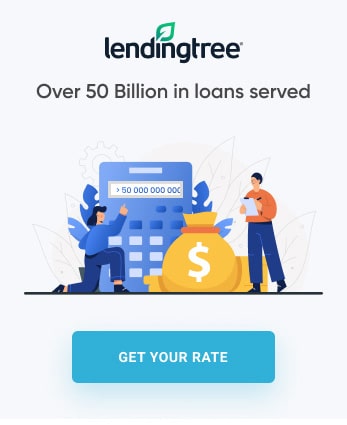Many modern consumers struggle to balance open credit balances, monthly payments, and build a healthy credit score for optimal personal finances.
According to debt.org, the average American has over $90,000 in debt, which is a combination of credit card balances, student loans, and mortgages.
As we will discuss, there are some good types of debt, and there are some bad types of debt.
Personal loans can be a valuable tool to help make debt management simple and straightforward because they offer fixed interest rates and payoff dates.
Read on to learn more about personal loans, how they can help consumers build their credit scores and ultimately make the debt more manageable.
Debt And Credit
The concept of credit has been around for thousands of years, where a borrower will receive money upfront in exchange to pay it back later with interest.
Simply put, interest is the price we pay to borrow money because that money could have been put to work elsewhere.
Many lenders are on the modern market; some are highly reputable and enable people to purchase a home or start a business, while others charge exorbitant interest and can be very deceitful.
It’s vital to research any lender you potentially work with to ensure they are trustworthy and align with your financial needs.
Customer reviews and online testimonials are great resources to perform your own due diligence and research.
Good Debt Vs. Bad Debt
Although there are a multitude of different lending products available, it’s important to distinguish good debt from bad debt.
Good debt offers affordable interest rates and enables you to improve your quality of life over time. Popular examples of good debt are mortgages because a home loan allows you to purchase a home to live in or to rent, and the payments are predictable.
Another example of good debt may be a student loan or business loan because they enable you to invest in your future either by getting an education or starting your own business.
If you are considering a student loan or small business loan, spend some time to see if there is a good chance that borrowing money now will enable you to earn more in the future.
Bad debt generally consists of high-interest credit that does not provide positive financial benefits. The primary bad debt culprits are credit card balances and payday loans. These forms of debt often charge interest rates of well over 20% and do not provide any additional benefits.
While many credit cards may offer valuable rewards and balances, carrying a balance and paying these high-interest charges will quickly negate any prior benefits.
The best way to avoid bad debt is to pay balances on credit cards and other high-interest loans quickly and in full as soon as possible.
Credit Scores
Although having a good or excellent credit score is a popular and beneficial financial goal, there are many misconceptions about what makes a good or excellent credit score compared to fair or low credit scores.
Below are the components of a FICO credit score, how much each component is weighted, and how you can optimize each one:
- Amounts Owed 30%
The total amounts owed is one of the highest-weighted credit score components because it represents the entire outstanding balance of a credit account. This includes mortgages, student loans, credit cards, and more to summarize your total debt.
- New Credit 10%
The age your debt balances has an impact on your total credit score because the credit bureaus and lenders want to know how often you open new credit lines. Whenever you apply for a loan or open a new credit card, that line of credit becomes the newest in your credit history. Banks do not like to see too many recent credit requests at once because it may indicate future default risk.
- Payment History 35%
Payment history is the most component factor in a credit score because it answers the question, “does this borrower pay balances on time?” Consumers who consistently pay their balances and pay more than the minimum generally have the highest credit scores because they have proven that they are responsible for paying their debts and managing their balances effectively.
Conversely, missing payments and defaulting on loans can have a negative impact on a credit score because the lenders and credit bureaus will be less likely to extend new credit.
- Length Of Credit History 15%
Longer credit histories have more data and paint a more in-depth picture of someone’s borrowing behavior vs. someone who just opened a credit account for the first time.
Established credit accounts with longer payment data will help increase credit scores because the lender has more information when they calculate your loan and credit terms.
- Credit Mix 10%
The final component of a credit score is the mix of different credit types on a credit profile. Credit cards, auto loans, personal loans, and mortgages are all different types of credit, and managing a mix of other loans while maintaining a positive payment history can be beneficial to the overall credit score.
Introduction To Personal Loans
Now that we have an understanding of debt and credit, it’s time to shift focus to a unique lending product – personal loans.
Personal loans are versatile debt instruments that offer terms ranging from 3-72 months or more and interest rates that can be as low as 5.99% up to 36.99% at the top end.
Consumers use personal loans for a variety of reasons, including debt consolidation, financing home improvements, and building a cash cushion for lower interest rates than a credit card may offer.
Applying for personal loans is simple and straightforward because most banks and lenders utilize an online application portal that can help match you with a loan in minutes.
How Personal Loans Can Help You Build Credit
Regardless of where you are on your credit journey, a personal loan can help you build credit.
Looking back at the different credit score components, we can see that having a mix of credit lines can help boost credit scores. Personal loans are distinctly different from other credit types like credit cards and auto loans.
Personal loans can also boost credit scores by helping your overall balance and payment history. Many people use personal loans to consolidate debt by paying off higher interest balances and replacing them with a single monthly personal loan payment.
For consumers with limited credit histories, personal loans can add to their credit foundations by providing access to an installment loan. Once the personal loan is paid off, it will be a strong component of their credit history which may help them receive terms that work better for their financial situation in the future.
Use Personal Loans To Pay Down Bad Debt
Along with building credit scores, personal loans can help consumers pay down debt quickly and efficiently.
Some consumers are stuck in a cycle of revolving credit that seems endless, while others have a difficult time juggling multiple balances simultaneously.
Thankfully, personal loans can provide solutions to help cut down on bad debt and lower total interest costs simultaneously.
- Manage Revolving Credit Lines
Revolving credit lines can be a blessing or a curse depending on if they are kept under control or allowed to balloon and accrue interest.
The most popular revolving credit lines are credit cards because you can keep adding to the balance as you are paying it off. If the monthly balance is consistently paid off, the card will not charge any interest fees.
However, as soon as a balance is carried into the next month, it will begin accruing interest which can start a dangerous cycle of playing catchup with a credit card balance.
Personal loans can be used to pay off a high credit card balance, often with a substantially lower rate. By using a personal loan to take the balance off of the revolving credit line, the interest payment will be fixed along with the payoff date.
Over the long run, this can save hundreds or thousands of dollars in interest over the life of the loan.
- Consolidate Multiple Smaller Balances With A Lower Interest Rate
Another issue many consumers face is managing many different credit lines that have different due dates and variable interest rates.
Balancing a bunch of different credit lines and payment schedules can quickly become expensive, overwhelming and make budgeting monthly cash flows difficult.
Personal loan funds can be used to pay off all of the other small balances and consolidate them into one fixed monthly payment with a set interest rate.
Instead of managing many different payments, consumers will only need to budget for the one monthly personal loan payment. Having a predictable monthly payment can provide peace of mind because it makes budgeting and managing monthly cash flows much simpler.
Implementing Financial Discipline
While personal loans can be powerful financial tools, they are only as helpful as the discipline behind the borrower. Developing financial solid habits helps strengthen resolve and discipline and propel consumers into a better relationship with money.
Here are a few tips to managing personal loans so you can enjoy the benefits they provide:
- Budget For Your Monthly Payments
If you were previously underwater with many payments or a large credit card balance that proved to be overwhelming, don’t slack off when you use a personal loan to consolidate your debts.
Instead, mark out the monthly due date on your calendars so you can see when the payment is due, so you don’t miss it. This will help your monthly budget and your credit score because you won’t miss a payment.
If you can, set aside a couple of months worth of payments, so you have a buffer in case an unexpected expense comes up.
- Avoid Unnecessary Fees
Many personal loan providers have fee waivers for everything from origination fees to wire transfer fees, so it’s important to shop around and avoid fees as much as possible.
Lenders generally charge late payment fees, so an easy way to avoid these is to schedule automatic payments, so you don’t let the monthly payment slip your mind.
- Update Your Lender With Any Changes To Your Situation
As much as you can prepare, life happens. Sometimes this means promotion at work or being suddenly laid off.
If you experience a significant life event, let your lender know as soon as possible. If you get a higher credit score or a raise at work, you may qualify for a rate reduction or refinance.
If you lose your employment unexpectedly, tell your lender because many of them are willing to defer or temporarily reduce payments. But you have to tell them because they will not know otherwise.
Final Thoughts
As you can see, personal loans are versatile instruments that can help boost your credit score and pay the debt down quickly.
If you want to learn more about personal loans and read reviews of different lenders, be sure to check out our other guides and reviews!
* This content is not provided by the financial institution or the offer’s provider. Any opinions, analyses, reviews or recommendations expressed here are those of the author’s alone, and does not constitute a financial or expert advice.







